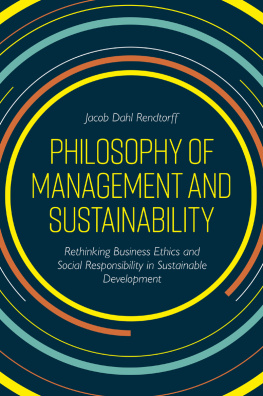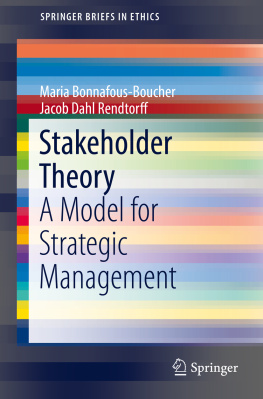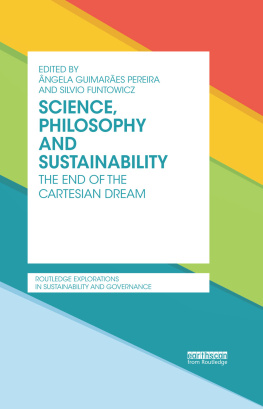Jacob Dahl Rendtorff - Philosophy of Management and Sustainability
Here you can read online Jacob Dahl Rendtorff - Philosophy of Management and Sustainability full text of the book (entire story) in english for free. Download pdf and epub, get meaning, cover and reviews about this ebook. year: 2019, publisher: Emerald Publishing, genre: Politics. Description of the work, (preface) as well as reviews are available. Best literature library LitArk.com created for fans of good reading and offers a wide selection of genres:
Romance novel
Science fiction
Adventure
Detective
Science
History
Home and family
Prose
Art
Politics
Computer
Non-fiction
Religion
Business
Children
Humor
Choose a favorite category and find really read worthwhile books. Enjoy immersion in the world of imagination, feel the emotions of the characters or learn something new for yourself, make an fascinating discovery.
- Book:Philosophy of Management and Sustainability
- Author:
- Publisher:Emerald Publishing
- Genre:
- Year:2019
- Rating:3 / 5
- Favourites:Add to favourites
- Your mark:
- 60
- 1
- 2
- 3
- 4
- 5
Philosophy of Management and Sustainability: summary, description and annotation
We offer to read an annotation, description, summary or preface (depends on what the author of the book "Philosophy of Management and Sustainability" wrote himself). If you haven't found the necessary information about the book — write in the comments, we will try to find it.
Philosophy of Management and Sustainability — read online for free the complete book (whole text) full work
Below is the text of the book, divided by pages. System saving the place of the last page read, allows you to conveniently read the book "Philosophy of Management and Sustainability" online for free, without having to search again every time where you left off. Put a bookmark, and you can go to the page where you finished reading at any time.
Font size:
Interval:
Bookmark:
Our time is the time of globalization. Today globalization has become a concept that concerns the universalization of languages and cultures in a world that is emerging as One World (Rendtorff, 2017). Yet, in the beginning, the concept of globalization has been an economic concept (Brown & Held, 2010). It was a concept that in the economic and social debate posed a challenge to the traditional concepts of the economy. In the current situation, the idea of globalization marks the break with a paradigm of the national state and with all its institutions as well as globalization represents the emergence of an international and cosmopolitan system that goes beyond the state system. There are even economists who think that this rupture implies the emergence of a new paradigm of the international economy where we must describe the global interaction rather than the system of the national state. We can say that we should propose a political and economic science that is truly cosmopolitan. In addition, it is up to us to define the content of this new cosmopolitan science of global ethics of sustainability in relation to ethics and international justice (Held, 1995a, 1995b).
Although we started with a narrow state system and an international economy after the Second World War with an economy without many multinational companies, we are now in the situation of a global economy where the market economy with the end of the cold war has become truly international. This is why we need a new theory of international relations, which also raises the problem of sustainability as a problem of ethics and justice at the international level.
In the same way, globalization also poses a challenge to developing economies, being both a threat and a possibility for these countries and cultures. When talking about the countries of the Middle East and Africa and in the area of globalization, it would also be necessary to go beyond the paradigm of the national state. It is necessary to think of the Middle East and Africa in the process of integration in a cosmopolitan system, that is to say, a search for a sustainable Cosmopolis where all cultures meet in a specific country. One aspect of this globalization is the critical relation to companies that can operate anywhere in the world (Rendtorff, 2009). It is globalization with the fatal consequences for the happy life of people in local cultures and countries. One can speak of the accumulation of the circulation of goods and capital, which implies the intensification of poverty in developing countries in the Middle East and Africa.
So, it is a challenge for a philosophy of global globalization to think of justice for the cosmopolitan society that goes beyond the level of the national state (Beck, 2001). In this situation of the globalization of the economy with its potential consequences of the worsening inequality in the world we could say that we are looking for a democracy and publicity at the global level that can take into account the possibilities and limits of economic globalization in relation to political and democratic stability.
It is the political philosophys duty to think of this other globalization, not only as a utopia for the world, but also as a realistic and current alternative vision for international society. The dream of another globalization is expressed in the search for international and civil governance structures that can give meaning to globalization and help to manage the free flow of goods and capital. But, it is above all a problem of security and political stability. We need a vision of democratic integration of countries and cultures into the international system. This is the vision not of exclusion, but of the respectful integration of the Middle East and Africa into the processes of globalization that goes beyond military and war conflicts and political instability.
We want to take an attempt to make a critique of globalization from the dream of another globalization that goes beyond poverty and international economic inequality, described by the French economist Thomas Piketty (Piketty, 2014). Based on this problem, this chapter will present a vision of another globalization by discussing globalization in relation to the democratization of national and international governance. It is about proposing a project of philosophy of globalization that is moving toward a cosmopolitan ethical vision of international justice of relations between countries and regions of the world.
In his book Power and Counter-Power in the Age of Globalization (2003) and What Is Cosmopolitanism? (2006) Ulrich Beck describes the process of globalization in a way that can help us to offer this vision of a critical philosophy of globalization. We can say that with globalization we are confronted with the ecological, humanitarian, food, and military catastrophes of the world and above all that is why we need a reflexive space where we can confront globalization with a new critical philosophy. At the same time, we see the rise of nationalism in the Middle East, Africa, Europe, the United States, and around the world. Therefore, we must go beyond border policy and develop a transnational policy and a vision of a philosophy of globalization that can think of global sustainability and cosmopolitan justice (Beck, 2006).
This philosophy of globalization must study the consequences of globalization and the philosophical dimensions of interconnectedness and the growing institutional interdependence of the world, as proposed by the English professor David Held (Brown & Held, 2010). We should study how globalization expresses a historical transformation of the modern world in which we can observe that what is national is no longer national, but is part of the Cosmopolis as is the case with all the major cities of the world.
Following this, inspired by Ulrich Beck, we can say that cosmopolitanism is a fact of history. Beck calls this a cosmopolitan realism. He defines cosmopolitan realism as follows:
Realism, that is, cosmopolitan Machiavellianism, responds in particular to two questions. First: how and by what strategies do the players in the global economy impose on states the laws of their action? Secondly, how can states, in turn, reclaim a meta-political-political power to impose a cosmopolitan regime on global capital that also includes political freedom, global justice, social protection, and environmental preservation? (Beck, 2003, p. 12)
In other words: How to overcome realism and move toward international justice?
Beck speaks of the need for a new global political economy that includes the space of the transnational economy on one side and the international political world beyond the national state policy on the other side. The need for this cosmopolitan social theory is reflected in the many signs of globalization that Beck describes: Climate change, environmental destruction, global financial risks, population migration, and the anticipated consequences of nanotechnology and genetic innovations (Beck, 2003, p. 12). Moreover, we could add other cosmopolitan issues of poverty, inequality and all the problems of neo-colonialism in the world. Beck argues that we will have to overcome the division of the world by the state and culture to find a cosmopolitan common sense of accepting otherness that goes beyond ethnic, national, and religious differences to create an international cosmopolitan consciousness.
It is this search for the cosmopolitan spirit that Beck calls the second modernity. In addition, we can add that it is the duty of a new program of philosophical reflection to confront this new cosmopolitan modernity and think about its ethics, politics, and justice (Beck, 2006). Nevertheless, what kind of questions will we have to ask in order to analyze cosmopolitan modernity in a philosophical way? In particular, we can mention the issues of power and struggle for freedom and equality in the world. Moreover, in the present situation the importance of finding a peaceful solution to military conflicts in the Middle East is important to mention.
Font size:
Interval:
Bookmark:
Similar books «Philosophy of Management and Sustainability»
Look at similar books to Philosophy of Management and Sustainability. We have selected literature similar in name and meaning in the hope of providing readers with more options to find new, interesting, not yet read works.
Discussion, reviews of the book Philosophy of Management and Sustainability and just readers' own opinions. Leave your comments, write what you think about the work, its meaning or the main characters. Specify what exactly you liked and what you didn't like, and why you think so.











